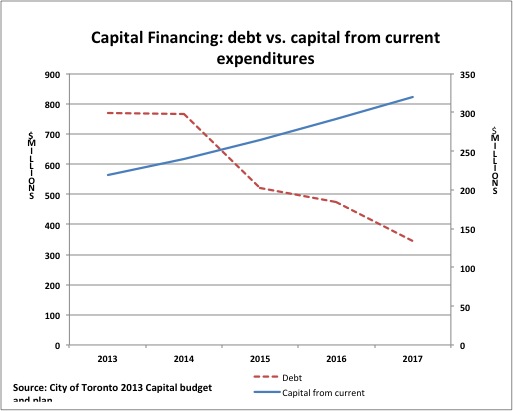City staff is recommending that Toronto City Councillors approve an operating budget that increases spending by less than 0.5 percent for the second year in a row. The Police Chief and Council have been debating the feasibility and impact of flatlining the police services budget. Whatever your view on police spending, the conversation about flatlining spending on city services needs to be broadened.
Toronto’s population is increasing by about 1 percent per year and inflation is increasing by about 2 percent per year. If council keeps flatlining, it means a real, per capita cut in services. There are some Toronto city councillors who consider this a victory. This lopsided view is like a family celebrating lower grocery bills without noticing that their children are hungry.
The chart below shows a gap of $368 million between proposed gross operating spending in 2013 and what we would need to keep the level of services we had in 2011. The longer spending is kept at zero the further we fall behind.
Operating Spending goes to Capital
Capital spending is important to the health of our city. But, it should not be financed at the expense of the services that we rely on. There are two ways in which the proposed 2013 budget redirects spending away from services and toward capital. The first is the proposal to use the entire 2012 surplus for capital expenditures. The chart below shows that over the last 5 years, the City has relied on a portion of this surplus to fund services. Because of the legislated requirement to balance its operating budget, the City has to be cautious in both its revenue and expenditure estimates. Surpluses are the result of that caution. A portion of the 2012 surplus should rightly be returned to the operating budget.
The capital budget and plan shows a move even further down this road of supporting capital expenditures at the expense of services. Chart 3 below shows the Budget’s proposed capital financing from operating and from debt. It shows a move away from debt financing and toward financing capital from the operating budget. This does a disservice both to our city’s need for capital expenditures and operating spending. Our capital needs exceed what can be squeezed out of the operating budget, and our operating budget supports important services and should not be redirected to capital.
Toronto’s 2013 austerity budget will increase inequality
The outcome of Councillors adopting this budget is clear. It will reduce services available to Torontonians. It also proposes a re-orientation of spending toward capital and away from services. Research shows the progressivity of government expenditures, in particular of spending on services. If Council approves this re-direction and plan for spending, it will most significantly have an impact on low-income Torontonians, but will also reach far beyond them. Some Torontonians will have to do without the public services they have relied on because they will not be able to afford to purchase them privately. For others, life will become far more expensive when they have to start paying privately for services their tax dollars used to pay for. Only those whose resources are so large that they rarely need to rely on public services will be unaffected. Given their higher incidence of low income, racialized and immigrant communities will once again be disproportionately affected.


